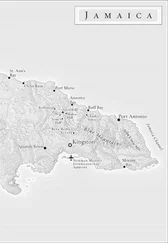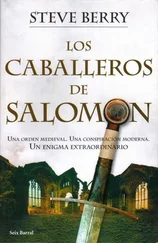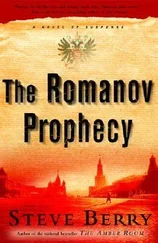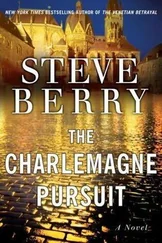Steve Berry - The Templar legacy
Здесь есть возможность читать онлайн «Steve Berry - The Templar legacy» весь текст электронной книги совершенно бесплатно (целиком полную версию без сокращений). В некоторых случаях можно слушать аудио, скачать через торрент в формате fb2 и присутствует краткое содержание. Жанр: Триллер, на английском языке. Описание произведения, (предисловие) а так же отзывы посетителей доступны на портале библиотеки ЛибКат.
- Название:The Templar legacy
- Автор:
- Жанр:
- Год:неизвестен
- ISBN:нет данных
- Рейтинг книги:5 / 5. Голосов: 1
-
Избранное:Добавить в избранное
- Отзывы:
-
Ваша оценка:
- 100
- 1
- 2
- 3
- 4
- 5
The Templar legacy: краткое содержание, описание и аннотация
Предлагаем к чтению аннотацию, описание, краткое содержание или предисловие (зависит от того, что написал сам автор книги «The Templar legacy»). Если вы не нашли необходимую информацию о книге — напишите в комментариях, мы постараемся отыскать её.
The Templar legacy — читать онлайн бесплатно полную книгу (весь текст) целиком
Ниже представлен текст книги, разбитый по страницам. Система сохранения места последней прочитанной страницы, позволяет с удобством читать онлайн бесплатно книгу «The Templar legacy», без необходимости каждый раз заново искать на чём Вы остановились. Поставьте закладку, и сможете в любой момент перейти на страницу, на которой закончили чтение.
Интервал:
Закладка:
But something nagged at him.
When he was twelve he'd learned that he'd been born with an eidetic memory. Not photographic, as movies and books liked to portray, just an excellent recall of details that most people forgot. It certainly helped with studying, and languages came easy, but trying to pluck one detail from so many could, at times, aggravate him.
Like now.
TEN
DE ROQUEFORT TRIPPED THE FRONT DOOR LOCK AND ENTERED the bookshop. Two of his men followed him inside. The other two were stationed outside to watch the street.
They crept past darkened shelves to the rear of the cluttered ground floor and climbed narrow stairs. No sound betrayed their presence. On the top floor, de Roquefort stepped through an open doorway into a lit apartment. Peter Hansen was ensconced in a chair reading, a beer on the table beside him, a cigarette burning in an ashtray.
Surprise flooded the book dealer's face. "What are you doing here?" Hansen demanded in French.
"We had an arrangement."
The dealer sprang to his feet. "We were outbid. What was I to do?"
"You told me there'd be no problem." His associates moved to the far side of the room, near the windows. He stayed at the door.
"That book sold for fifty thousand kroner. An outrageous price," Hansen said.
"Who outbid you?"
"The auction will not reveal such information."
De Roquefort wondered if Hansen thought him that stupid. "I paid you to ensure that Stephanie Nelle was the purchaser."
"And I tried. But no one told me the book would go for such a price. I stayed with the bidding, but she waved me off. Were you willing to pay more than fifty thousand kroner?"
"I would have paid whatever it took."
"You weren't there, and she was not as determined." Hansen seemed to relax, the initial surprise replaced with a smugness de Roquefort fought hard to ignore. "And besides, what makes that book so valuable?"
He surveyed the tight room, which reeked of alcohol and nicotine. Hundreds of books lay scattered among stacks of newspapers and magazines. He wondered how anyone lived in such disarray. "You tell me."
Hansen shrugged. "I have no idea. She wouldn't say why she wanted it."
De Roquefort's patience was wearing thin. "I know who outbid you."
"How?"
"As you well know, the attendants at the auction are negotiable. Ms. Nelle contacted you to act as her agent. I contacted you to make sure she obtained the book so that I might have a copy before you turned it over to her. Then you arranged for a telephone bidder."
Hansen smiled. "Took you long enough to figure that one out."
"Actually it took me only a few moments, once I had information."
"Since I now have control of the book and Stephanie Nelle is out of the picture, what is it worth for just you to have it?"
De Roquefort already knew what course he would be taking. "Actually, the question is, how much is the book worth to you?"
"It means nothing to me."
He motioned and his two associates grabbed Hansen's arms. De Roquefort jammed a fist into the book dealer's abdomen. Hansen spit out a breath, then slumped forward, held upright by his limbs.
"I wanted Stephanie Nelle to have the book, after I made a copy," de Roquefort said. "That was what I paid you to do. Nothing more. You once possessed a use to me. That's no longer the case."
"I… have the… book."
He shrugged. "That's a lie. I know exactly where the book is."
Hansen shook his head. "You won't… get it."
"You're wrong. In fact, it will be an easy matter."
MALONE FLIPPED ON THE FLUORESCENT LIGHTS OVER THE HISTORY section. Books of every shape, size, and color consumed the black lacquered shelves. But there was one volume in particular he recalled from a few weeks back. He'd bought it, along with several other mid-twentieth-century histories, from an Italian who'd thought his wares worth far more than Malone was willing to pay. Most sellers did not understand that value was a factor of desire, scarcity, and uniqueness. Age was not necessarily important since, just as in the twenty-first century, a lot of junk had always been printed.
He recalled selling a few of the Italian's books, but was hoping that one of them was still around. He could not remember it leaving the store, though one of his employees might have made a sale. But thankfully the book remained on the second row from the bottom, precisely where he'd first placed it.
No dust jacket protected the clothbound cover, which was once surely a deep green, now faded to light lime. Its pages were tissue-thin, gilt-edged, and littered with engravings. The title was still visible in patchy gold lettering.
The Knights of the Temple of Solomon.
The copyright read 1922 and, when he first saw it, Malone had become interested since the Templars were a subject he'd read little about. He knew they were not mere monks, more religious warriors-a sort of spiritualized special forces unit. But his rather simplistic conception was of white-clad men sporting stylish red crosses. A Hollywood stereotype, surely. And he recalled being fascinated as he'd thumbed through the volume.
He carried the book to one of several club chairs that dotted the store, settled himself into the soft folds, and started to read. Gradually, a summary began to formulate.
By AD 1118 Christians once again controlled the Holy Land. The First Crusade had been a resounding success. And though the Muslims were defeated, their lands confiscated, their cities occupied, they'd not been vanquished. Instead, they remained on the fringe of the newly established Christian kingdoms, wreaking havoc on all who ventured to the Holy Land.
Safe pilgrimage to holy sites was one of the reasons for the Crusades, and road tolls were the chief revenue source for the newly formed Christian Kingdom of Jerusalem. Pilgrims were streaming by the day into the Holy Land, arriving alone, in pairs, groups, or sometimes as entire uprooted communities. Unfortunately, the roads in and out were not secure. Muslims lay in wait, bandits roamed freely, even Christian soldiers were a threat since pillage was, to them, a normal course of forage.
So when a knight from Champagne, Hugh de Payens, founded a new movement consisting of himself and eight others, a monastic order of fighting brothers dedicated to providing safe passage to pilgrims, the concept was met with widespread approval. Baldwin II, who ruled Jerusalem, granted the new order shelter under the al Aqsa mosque, a place Christians believed to be the former Temple of Solomon, so the new order took its name from its headquarters: the Poor Fellow-Soldiers of Christ and the Temple of Solomon at Jerusalem.
The brotherhood initially stayed small. Each knight pledged vows of poverty, chastity, and obedience. They owned nothing individually. All of their worldly goods became the Order's. They lived in common and took their meals in silence. They cropped their hair, but let their beards grow. Charity supplied their food and clothing and St. Augustine provided the model for their monasticism. The Order's seal was particularly symbolic: two knights riding a single mount-a clear reference to the days when knights could not afford their own horse.
A religious order of fighting men was not, to the medieval mind, a contradiction. Instead, the new Order appealed to both religious fervor and martial prowess. Its creation also solved another problem-that of manpower-since now there existed a constant presence of trusted fighters.
By 1128 the fellowship had expanded, finding political support in powerful places. European princes and prelates donated land, money, and materials. The pope ultimately sanctioned the Order, and soon the Knights Templar became the only standing army in the Holy Land.
A strict Rule of 686 laws governed them. Hunting was forbidden. No gaming, hawking, or gambling. Speech was practiced sparingly and without laughter. Ornamentation was banned. They slept with the lights on, dressed in shirts, vests, and pantaloons, ready for battle.
Читать дальшеИнтервал:
Закладка:
Похожие книги на «The Templar legacy»
Представляем Вашему вниманию похожие книги на «The Templar legacy» списком для выбора. Мы отобрали схожую по названию и смыслу литературу в надежде предоставить читателям больше вариантов отыскать новые, интересные, ещё непрочитанные произведения.
Обсуждение, отзывы о книге «The Templar legacy» и просто собственные мнения читателей. Оставьте ваши комментарии, напишите, что Вы думаете о произведении, его смысле или главных героях. Укажите что конкретно понравилось, а что нет, и почему Вы так считаете.











